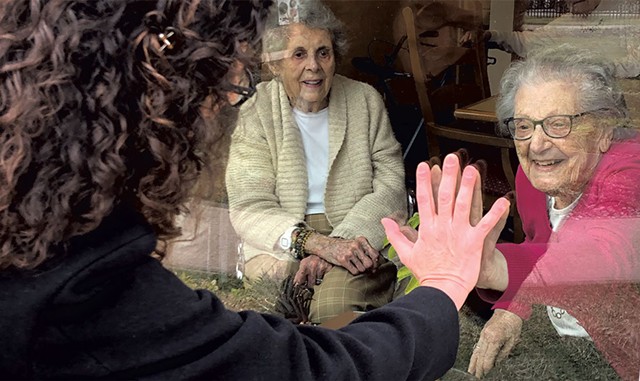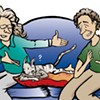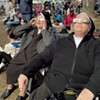click to enlarge 
- Courtesy of Suzie McCoy
- Visiting my mom and her friend Sue at the Converse Home in March 2020
My mother died early in the pandemic, though at the time neither of us had any idea how long the crisis would last. We spent the first four weeks waving at each other through the windows at Burlington's Converse Home. On April 16, Mom was diagnosed with late-stage ovarian cancer. Because she was terminal, I was allowed to be with her throughout her rapid decline and death. She was gone before the lilacs were.
I'm grateful that she died peacefully in her apartment and also, frankly, that she mostly missed the pandemic. She loved people and, at age 91, found the courage to move from Maryland to be closer to me. She made and cherished friends. I know the social isolation of the past year would have killed her, and I think she knew it, too. In fact, I suspect she might have died to avoid it.
Like every reputable assisted living facility in Vermont, the Converse Home had super-strict coronavirus protocols. Residents were confined to their rooms. And in those first few months, staffers were terrified of infecting the elders in their care.
But they were also rightly concerned about the ill effects of quarantine on residents. I saw workers go to great lengths to facilitate FaceTime talks with family members, deliver delicious meals and organize hallway bingo games. They came in to sing, chat and help with devices. One day the beleaguered activities director arranged for a concert on Adams Street, with students singing operatic arias and Frank Sinatra tunes. Residents, including my dying mom, could hear the music from their rooms.
Things got a lot harder after that.
In the summer of 2019, Seven Days and Vermont Public Radio had joined forces to scrutinize the inspection records of the state's eldercare facilities. We uncovered some alarming violations, and the stories and database in our collaborative Worse for Care series won numerous honors, including a national Edward R. Murrow Award for Investigative Reporting.
Following up this winter, our reporters found a different kind of abuse: the mental and physical ravages of COVID-19 avoidance, which for many elders has amounted to long-term solitary confinement. Because the state's oldest residents are most likely to die of the coronavirus, health policies have been designed to protect them, at almost all costs. For some, it's been a terrible trade-off: life or liberty.
Derek Brouwer and VPR's Liam Elder-Connors found that the pursuit of happiness is a crucial motivator, too. In this week's cover story, "Isolation Wards," they document how residents of these facilities have fared while the virus kept families — and regulators — away.
It's a reminder that as Vermont emerges from this crisis and we mourn those we've lost, we should also examine the price of survival.




















































